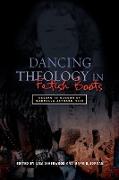- Start
- Dancing Theology in Fetish Boots
Dancing Theology in Fetish Boots
Angebote / Angebote:
Dancing Theology in Fetish Boots is both a tribute and an engaged response to the work of Marcella Althaus-Reid. A wide range of internationally renowned theologians show the breadth and depth of the impact she made in her all too short academic life. The scholars gathered in these pages wish to honour her contribution and to continue her legacy.
The authors come to the work of Marcella Althaus-Reid from a wide range of interests, disciplines and locations. Their essays show how many applications and extensions her work elicits in academic, political and pastoral contexts.
Lisa Isherwood is Professor of Feminist Liberation Theologies and Director of the Institute for Theological Partnerships at the University of Winchester.
Mark D. Jordan is R. R. Niebuhr Professor of Theology at Harvard Divinity School.
Contributors: Robert Shore-Goss, Mary E. Hunt, Kwok Pui-lan, Kathleen M. Sands, Emily M. Townes, Mayra Rivera Rivera, Susannah Cornwall, Elizabeth Stuart, Alistair Kee, Lea D. Brown, Jay Emerson Johnson, Graham Ward, Natalie K. Watson, Ivan Petrella, Hugo Córdova Quero, Mario I. Aguilar, André S. Musskopf, Nancy Cardoso Perreira and Cláudio Carvalhaes, Rosemary Radford Ruether.
'Following the full-bodied creativity and unsparing critique that mark the genius of Marcella Althaus Reid, this collection constitutes no vanilla homage. It reads like a true Argentinian tango: equal parts love-making, lament, rage, humour and challenge. An impressive array of scholars take up and talk back to her sacramental, liberationist, fleshy theology. The result is a testament to Althaus-Reid's own passions for justice, for outcasts and for celebration even in the face of death.'
Laurel C. Schneider, Professor of Theology, Ethics and Culture, Chicago Theological Seminary
'Lisa Isherwood and Mark Jordan have gathered a moving and inspiring collection of essays in honour of the courageous theologian, Marcella Althaus-Reid. The essays refract many ways in which Marcella has broken open theological spaces in a way that is utterly unique. Like Marcella's work, they invite us to enlarge our minds and our hearts to the outrageous openness of embodied, incarnate love. It is to be hoped that this collection introduces a larger readership to the consolations of queer theology and its significance for all theological thinkers.'
Wendy Farley, Professor of Religion and Ethics, Emory University
Folgt in ca. 10 Arbeitstagen
